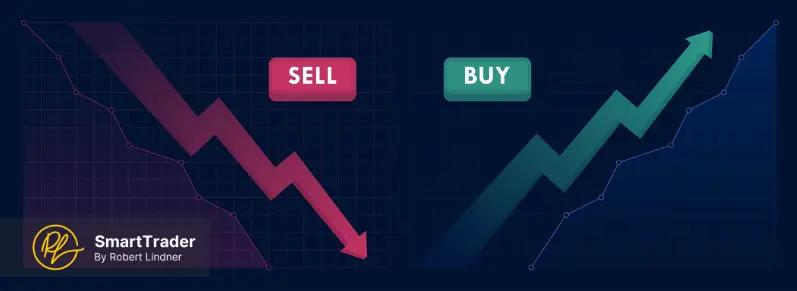1. Introduction to Trading Signals
Definition and Importance
Trading signals, in their simplest form, are recommendations made by (ideally) experienced traders or automated systems that indicate when it might be a good time to buy or sell a specific asset. These signals are the result of detailed market analysis and can be based on a variety of data points, including price movements, market trends, economic indicators, and more. Their role in modern trading has grown, as they provide both novice and seasoned investors with critical insights that aid in making informed trading decisions. Unfortunately, there are also black sheep in the industry who publish / sell trading signals that are not based on a meaningful market analysis – therefore, it's crucial to choose a trustworthy provider like SmartTrader, known for its transparency and reliability.
Popularity of Trading Signals in Modern Trading
The advent of digital trading has revolutionized how we interact with financial markets. This digitalization has led to an increased accessibility of trading signals, making them a popular tool among a wide spectrum of traders. From day traders who thrive on the fast-paced environment of the markets to long-term investors who seek sustained growth, trading signals have become very popular and are part of trading strategies. Their ability to simplify complex market data into actionable information makes them especially appealing in today's fast-moving trading world.
Quick Tips to Identify Whether Trading Signals are Analysis Based
To determine whether trading signals are based on in-depth analysis, there are several indicators you can look for. Quality signals often come with detailed explanations of the analysis behind them, providing transparency into the methodologies and data sources used. They are typically generated by experienced analysts who have a deep understanding of market dynamics. Reliable signals also come with a track record of performance, allowing you to gauge their historical accuracy and effectiveness.
Unrivaled Market Analyses
2. Exploring Types of Trading Signals
Day Trading Signals: Fast-Paced Market Decisions
Day trading signals cater to traders who operate on a short-term basis, usually within a single trading day. These signals help traders capitalize on quick market movements and are particularly useful in volatile market conditions. Day trading signals can encompass a variety of financial instruments and are often characterized by their rapid execution and high-frequency trading approach.
Forex Trading Signals: Navigating the Currency Markets
Forex trading signals provide insights into the highly dynamic world of currency trading. These signals can help navigate the complexities of the Forex market, offering predictions on currency pair movements influenced by global economic changes, interest rates, geopolitical events, and other macroeconomic factors. For instance, a Forex trading signal might suggest buying EUR/USD based on anticipated economic announcements in Europe that could strengthen the Euro against the Dollar.
Stock Trading Signals: Insights for Equity Markets
Stock trading signals provide traders with guidance on potential stock buys and sells. These signals take into account various factors such as corporate news, financial reports, industry trends, and market sentiment. They are useful for traders looking to make informed decisions in the stock market, whether dealing with well-established blue-chip stocks or exploring emerging sectors.

Crypto Trading Signals: Understanding Digital Currency Markets
In the volatile and often unpredictable world of cryptocurrency, crypto trading signals serve as a vital tool for traders. These signals provide insights into potential market movements, helping traders navigate the digital currency markets with greater confidence. They are based on an analysis of market trends, global events, and changes in supply and demand within the crypto market.
Commodity Trading Signals: Profiting from Physical Goods
Commodity trading signals focus on assets like gold, oil, metals, agricultural products, and other physical goods. They are influenced by a range of global economic factors including geopolitical events, supply chain dynamics, and changes in demand. For example, a commodity trading signal might suggest buying gold in anticipation of market uncertainty, as gold is often considered a ‘safe haven' during turbulent times.
Fundamental Analysis Trading Signals: The Power of In-Depth Market Insights & Analysis
Fundamental analysis trading signals are based on a comprehensive evaluation of economic indicators, company performance, market conditions, and other fundamental factors. These signals provide deep insights into the markets, allowing traders to make decisions based on solid economic foundations. Robert Lindner's trading signals at SmartTrader, for instance, are a prime example of this, as they are grounded in extensive fundamental and even sentiment analysis, offering a robust approach to trading.
Table: Overview of Different Types of Trading Signals
| Type of Signal | Description | Typical Use Case |
|---|---|---|
| Day Trading Signals | Short-term signals for quick trades within a single day. | Ideal for traders who operate on a very short-term basis and can make fast decisions. |
| Forex Trading Signals | Recommendations on currency pair movements based on global economic changes. | Useful for traders in the currency markets looking to benefit from forex market volatility. |
| Stock Trading Signals | Insights on when to buy or sell stocks, based on company news and market trends. | Beneficial for traders in the equity market, from blue-chip to emerging stocks. |
| Crypto Trading Signals | Signals for trading digital currencies, considering their volatile nature. | Suited for traders in the cryptocurrency market who need to navigate its unpredictability. |
| Commodity Trading Signals | Trading insights on physical goods like gold, oil, metals and agricultural products. | For traders focusing on commodities impacted by global economic trends. |
| Fundamental Analysis Signals | Based on a thorough analysis of economic indicators and market conditions. | For traders who prefer in-depth market analysis and more reliable trading signals. Also allows medium- & long-term trading. |
3. The Mechanics of Trading Signals
Behind the Scenes of Signal Generation
Trading signals are generated through a systematic analysis of market data. This process can involve a range of methodologies, from automated algorithm-based systems to manual analysis by experienced traders. Algorithms might analyze market trends, price patterns, and historical data to generate signals, while manual analysis might involve a more nuanced interpretation of market news and economic indicators. It’s important that trading signals are posted by reputable experts such as Robert Lindner from SmartTrader or reputable companies.
The Critical Role of Fundamental and In-Depth Analysis
Fundamental analysis plays a critical role in the generation of high-quality trading signals. This type of analysis delves deep into the economic conditions that affect the markets, including company earnings, industry trends, economic policies, and geopolitical events. The thorough nature of this analysis ensures that the generated signals are based on a comprehensive understanding of the market conditions.
Technical Analysis and Key Indicators
Technical analysis is another popular method in the generation of trading signals. This approach relies on historical market data, primarily focusing on price movements and trading volumes. Key indicators used in technical analysis include moving averages, Relative Strength Index (RSI), Bollinger Bands, and others. However, it's important to note that trading signals based solely on technical analysis can often be unreliable due to their dependency on historical patterns that may not always predict future movements accurately.
Evaluating and Selecting the Best Trading Signals
When evaluating trading signals, several key criteria should be considered. These include the accuracy and consistency of the signals, transparency in their generation and their historical performance. Backtesting signals against historical data can provide insights into their reliability. It's also essential to ensure that the signals align with your individual trading style and goals.
4. Identifying High-Quality Trading Signals
Criteria for Trustworthy and Effective Signals
To identify high-quality trading signals, look for characteristics such as consistency in performance, transparency in the signal generation process, risk management strategies, and a high degree of accuracy. Trustworthy signals should provide clear entry and exit points, manage open positions including given updates on stop-loss and take-profit as well as giving traders a well-defined strategy for each trade.
Table: Criteria for High-Quality Trading Signals:
| Criteria | Description |
|---|---|
| Accuracy | The historical performance and success rate of the signals. |
| Consistency | How consistently the signals provide reliable results. |
| Risk Management | Open positions are managed with a high level of transparency and stop-loss levels, potentially risk-reward ratios are included. |
| Methodology Transparency | Clarity on how the signals are generated and the analysis behind them. |
| Track Record | Historical data and performance metrics to validate the signal's reliability. |
SmartTrader’s Methodology for Reliable Signals
SmartTrader's approach to trading signals involves a meticulous and transparent process. With a 100% transparency policy, SmartTrader not only offers the most reliable signals but also provides full access to its track record, including raw data. This level of openness allows traders to fully understand and trust the signals they are using, ensuring that every recommendation is backed by thorough analysis and proven strategies.
5. The Intersection of Technology and Trading Signals
Live Trading Signals: Making Timely Trades
Live trading signals provide real-time market insights, enabling traders to make immediate and informed decisions. These signals are particularly valuable in fast-moving markets where timing is crucial. They allow traders to capitalize on short-term market movements and react swiftly to changing market conditions.
SmartTrader's Technological Edge in Trading Signals
At the forefront of technological innovation in trading signals, SmartTrader leverages advanced AI and machine learning algorithms to analyze market data. This cutting-edge technology allows for the processing of vast amounts of data in real-time, ensuring that traders receive the most up-to-date and accurate signals possible. However, each signal comes additionally with a detailed manual analysis by Robert Lindner himself, SmartTrader's chief analyst.
6. Navigating Free vs. Paid Trading Signals
Advantages of Free Trading Signals
Free trading signals provide a risk-free way for beginners to get acquainted with the market and for experienced traders to test new strategies without financial commitment. While they offer valuable insights, it's important to understand that free signals might not always include the in-depth analysis and personalized recommendations found in paid services or are delayed.
When to Invest in Paid Trading Signals
As your trading experience grows, investing in paid trading signals can be beneficial. Paid signals typically offer more real-time detailed analysis, higher accuracy, and personalized recommendations tailored to your trading preferences and goals.
SmartTrader's Balanced Approach to Free and Premium Signals
SmartTrader offers both free and premium signals, catering to traders of varying experience levels and investment capacities. Their subscription models are designed to provide flexibility and value, allowing traders to choose the service level that best suits their needs.
7. Selecting the Right Trading Signals Provider
Essential Features of Top Signal Providers
When choosing a trading signals provider, consider factors like a proven track record of accuracy, transparency in signal generation, comprehensive customer support, and positive client testimonials. A good provider should also offer a range of services for different trading styles and levels of experience, and should offer comprehensive support, ensuring you understand and can effectively apply their trading signals and strategies.
Why SmartTrader Appeals to Traders at All Levels
SmartTrader stands out as a preferred choice for traders at all levels due to its comprehensive service offering, user-friendly interface, and commitment to transparency. With a 100% transparency policy and a complete publication of their track record, SmartTrader provides a level of trust and reliability that is unmatched in the industry.
Integrating Signals into Diverse Trading Strategies
SmartTrader's signals are versatile and can be adapted to a wide range of trading strategies, whether you're a day trader, swing trader, or long-term investor. The platform allows for personalization and flexibility, enabling traders to tailor signals to their individual trading styles and objectives.
8. Utilizing Trading Signals Effectively
Practical Tips for Signal Application
Effective use of trading signals involves more than just following recommendations. It requires a deep understanding of your own trading style, risk tolerance, and market conditions. Always use stop-loss orders to manage risk and combine signals with your own market analysis for the best results.
Tailoring Signals to Individual Trading Styles
The SmartTrader signals are designed to be customizable and can be adapted by traders (if they wish) to suit their specific trading styles and objectives. This flexibility ensures that traders can make the most out of the signals, regardless of their market focus or strategy.
9. Conclusion
Recap of Key Insights
This guide has provided a comprehensive overview of trading signals, covering their types, generation mechanics, and how to identify and utilize them effectively. It has emphasized the importance of in-depth analysis, technology, and selecting the right provider.
How SmartTrader Elevates Your Trading Experience
SmartTrader enhances the trading journey by offering reliable, transparent, and technologically advanced trading signals. With a focus on education and customization, SmartTrader equips traders with the tools and knowledge needed to navigate the financial markets successfully.
10. What's next?
Invitation to Discover SmartTrader’s Services
We invite you to explore the range of services offered by SmartTrader. Whether you're a beginner looking for guidance or an experienced trader seeking advanced tools, SmartTrader has something for everyone. Sign up for a free trial (such as joining our Telegram Trial channel: https://t.me/trial_smarttrader) or explore our premium offerings to begin your journey towards consistently successful trading with SmartTrader.







